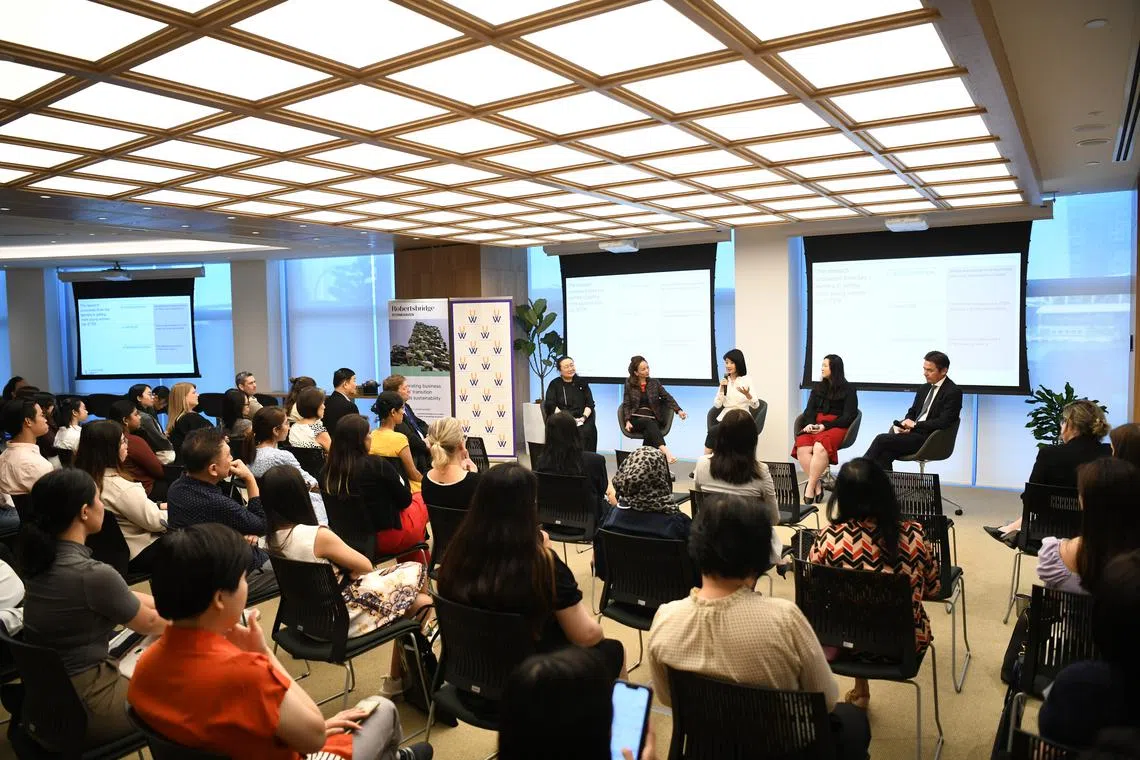Exposure to Stem careers crucial to get more young women into industry: Sun Xueling
Sign up now: Get ST's newsletters delivered to your inbox

Ms Sun Xueling shared at a panel discussion about encouraging young women to enter the Stem industry.
PHOTO: UNITED WOMEN SINGAPORE
Follow topic:
SINGAPORE - It is important for the science, technology, engineering and mathematics, or Stem, industry to work with schools and parents to paint a more accurate reflection of careers in Stem, said Minister of State for Social and Family Development Sun Xueling on Tuesday.
Ms Sun was the guest of honour at the unveiling of a research study conducted jointly by local non-profit United Women Singapore (UWS) and global strategy consultancy Robertsbridge Stonehaven.
The study, titled Girls in Stem: Building a Supportive Ecosystem, aims to shed light on the barriers to promoting Stem to young women, particularly parents’ lack of understanding and exposure to Stem careers.
The study highlighted three key barriers to getting young women to enter Stem careers: an intergenerational personal experience as a subconscious barrier, lack of exposure to Stem careers and female representation, and misconceptions of the true nature of jobs in Stem.
Sharing her thoughts on the study, Ms Sun elaborated that misconceptions about Stem careers could be held by parents who may not have had exposure to Stem. This leads to an intergenerational gap, where young girls may gravitate towards other sectors based on advice given by their parents.
However, given the rapid development of the Stem industry and the high-paying jobs it can provide, if girls start off with misconceptions about Stem careers, they may be channelled into slower-growing jobs that may not be materially meaningful for them, she said. Hence, exposure is crucial in bridging the gap and clarifying misconceptions about Stem.
Ms Sun noted the various initiatives by UWS to expose young women to Stem jobs. One of them is Stem First Fintech Programme, which aims to equip young women to go into their tertiary studies and working life with confidence in their abilities to control their own pathway into the fintech field.
These initiatives have also allowed beneficiaries to make connections in the industry, which can help with subsequent career development, she said.
A survey conducted by UWS in 2021 revealed that 44 per cent of females do not personally know anyone working in a Stem-related field, as compared with 32 per cent of males.
Ms Sun also spoke on the increasingly interdisciplinary nature of the Stem industry. “Stem is fast-growing and we should not see it just as a standalone. It cuts across different industries”, she said, citing the example of digital payments in the food and beverage industry.
“But parents may or may not know it, because it wasn’t (their) lived experience,” she explained. “And so we now need to play a little bit of catch-up, to help parents who may not have had those experiences.”
As such, Ms Sun encouraged more Stem companies to conduct roadshows and organise opportunities for young children to have first-hand exposure to the Stem industry, through activities such as site visits.
“Let them see what a day in the life of Engineer Emily or Banker Evan looks like, and it might change perspectives for them,” she said.
“A picture paints a thousand words.”

